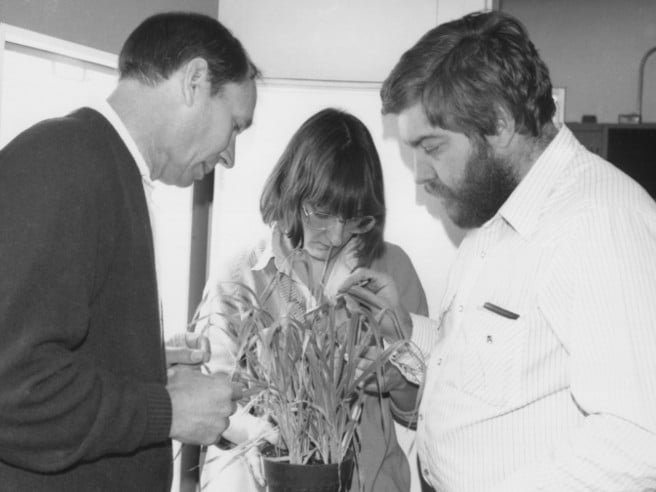The following remarks were recently given to graduates at this year’s virtual Spring Convocation celebration hosted by the University of Saskatchewan. Harvey was awarded an honorary Doctor of Science degree, the most prestigious award that can be bestowed upon a member of the University of Saskatchewan community and is granted to those who have made a significant contribution to their community.
Recognition by one’s peers is the highest accolade of all. It is the custom on these occasions that the recipient be asked to provide words of inspiration to the freshly minted crop of graduates. Given the thousands of times in which this has been done it is unlikely that I will be able to come up with something that has not already been said many times.
So perhaps it will help you to take a look at where you are in your lives. The first thing that you should be aware of is that you have had a first-class education. I know from personal experience, when I went to the University of California to do my PhD, I was a little worried that I might be behind other students at this prestigious institution.
I found, however, that I had been given an excellent background in my degrees at the U of S. I have since been involved in reviews of programs around the world and ours stands up with the best of them. So be proud of your achievement in completing the program.
What has this given you? It has exposed you to a number of things which are worth noting.
Leadership. This is the art of inspiring the very best in others. You are now the elite, so leadership roles are the expected norm for you. You have been exposed to many different approaches to leadership, choose those which are best suited to you and be involved.
Teamwork. Almost all career related experiences these days involve teamwork. You have learned the importance of the team approach and the necessity of working together with other professionals. The critical elements of good teamwork are trust, tolerance and respect. Be a team player.
Networking. During your time here you have developed an extensive network of friends and colleagues. Many of these will last you a lifetime. They are your support group so make sure that you nurture the relationships, grow them over time and contribute to them in a positive way. Do not take them for granted.
Communication skills. One of the most important things that we teach you is how to communicate both orally and in written form. The most brilliant thinking in the world is useless if it cannot be communicated to others. Refine this skill for the rest of your life.
Time management. Probably the most critical thing for you to have mastered is time management. You would not have made it this far without it. There is a time for work and a time for play, and a balance of the two is essential for a fulfilling life.
Body of knowledge. You have become expert in a particular field of knowledge. We provide you with many facts and conventions. Some of these are durable and long-lasting, others are out of date the moment we give them to you. You need to be able to recognize which are which and adapt accordingly. Do not look down your nose at facts; they are the tools with which we think, but remember that they are not immutable.
How to learn. This is what any degree is all about; you are now experts in learning about any subject under the sun. Use the talent wisely.
Critical thinking. The world these days is full of information; we are, in fact, inundated with it. The real trick is to critically evaluate the information and sort the wheat from the chaff. Be constructively critical of all information but try not to be too cynical.
Decision making. The reason that anyone would hire graduates like yourselves is your ability to gather information and to analyze situations. That is the easy part. The difficult part is weighing the pros and cons and reaching a reasoned decision. The easy route is to do nothing but it is not the right route.
Awareness of other places and times. Knowledge of how others have approached life’s issues is a mark of an educated person. One who is ignorant of history is doomed to repeat its mistakes.
If you put these skills to use you will surely succeed in life.
Let me tell you a little about my own story so that you can possibly learn something from it.
When I was hired as a faculty member my research responsibility was for barley, flax and oat. The department had a very limited budget and the only external funding was a small grant from the Brewing and Malting Barley Research Institute to be used for quality analyses.
It was clear to me that I had to focus. Given the resources and the acreage of the crops at the time, barley was the logical choice. It soon became evident to me that the potential for growth was in malting barley. In North America the market was dominated by six-row varieties; all Canadian beer at the time was made from six-row malt and the majority of American beer was, too. In the rest of the world two-row barley was the dominant type by far. Canada was a minor player, at best, outside North America. The BMBRI was certainly not about to support work on two-rows since their members were all six-row users.
So, what I did was to continue work on six-rows but I initiated a program for improvement of two-rows which I kept well in the background. Better to ask forgiveness than to seek permission. To compete internationally, Canada would have to have a quality product. Our climate limitations and our costs of moving product to market meant that we could not compete on a volume/price basis.
I knew that what was needed was to incorporate the high enzymatic levels of six-rows into the high-extract background of two-rows and thus combine the best of both. I was successful in doing that and the variety Harrington was the first product of that effort. It hit the market at a time when there was an international shortage of malting barley and an increase in demand especially in Asia including China.
Harrington met the high-quality standards of the Japanese market and helped us capture market share from the Australians over whom we had a clear quality advantage. Harrington also met the requirements of the Chinese market for high adjunct brewing. As the Chinese economy grew, so too did their demand for meat and beer. Their per capita consumption went from about 10 litres per person per year in the 1980s to quadruple that by the year 2000. They became the largest beer-producing country in the world.
The export demand grew to the point where it took over Canadian production and the local brewers soon came to realize that they could have greater access to better quality barley if they switched to two-rows, which they soon did. Saskatchewan became the major producer of malting barley in Canada and a major player in the world export market, a position it still holds today.
The key to success was doing the market research and looking long term. Setting the target and sticking to the goal despite resistance from established concerns; creating an end product which was what the market demanded, even if at the time they did not know it.
The end user is always right but the end user can be influenced by what is available. Create a quality product and produce it at a fair price and you have the potential for success.
Finally, let me conclude with a few remarks about agriculture. As agricultural professionals, you are now part of a proud legacy. Agriculture is the backbone of any civilization. Without it, no civilization could exist. Without it there would be no written language, no numerical system and no time for the arts which so enrich our lives.
Through their passion and hard work your predecessors have created a system where we have the safest, most affordable, most varied and most nutritious food supply in the history of humankind, despite what you often hear in the popular media. During the 1950s an average family spent over a third of its income on food and rarely if ever ate at a restaurant; today it is less than 10% and that includes eating out on a regular basis. Cases of food poisoning are extremely rare.
We take it for granted that we can get fresh produce of any kind throughout the year. One might argue that we have done too good a job, but who amongst us has been truly hungry? Lest we become too complacent, however, we need to remember that even now there are more people negatively impacted by hunger and malnutrition in the world than malaria and HIV put together, and probably even COVID-19. There is still plenty to do.
You as professionals need to ensure that science is at the basis of decision making, not knee-jerk reactions to social media hype. It is your responsibility to speak up and be heard.














